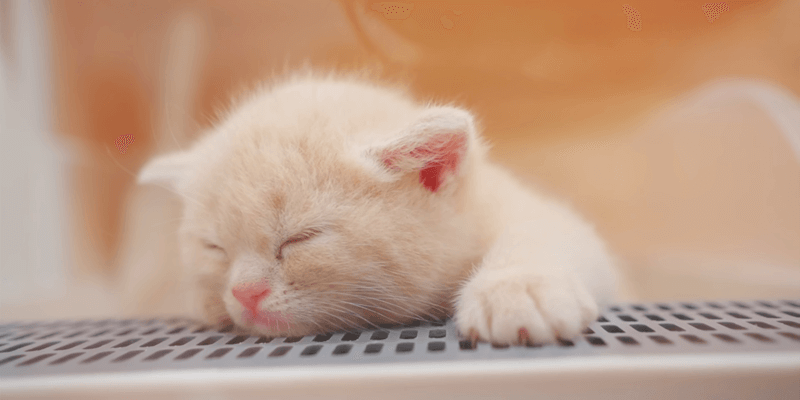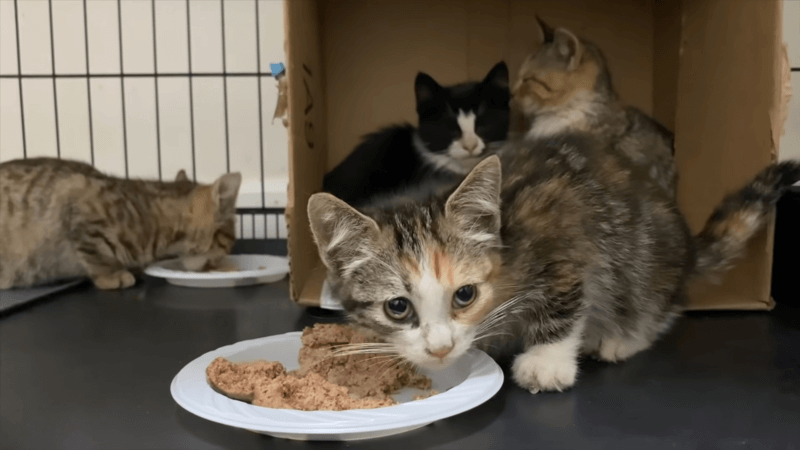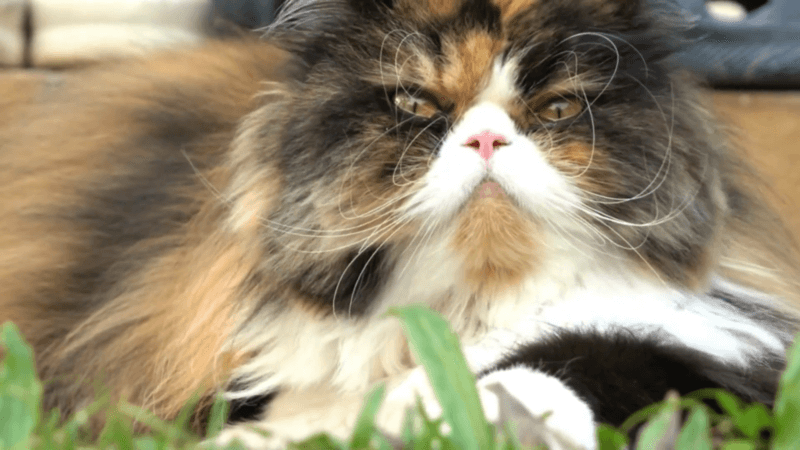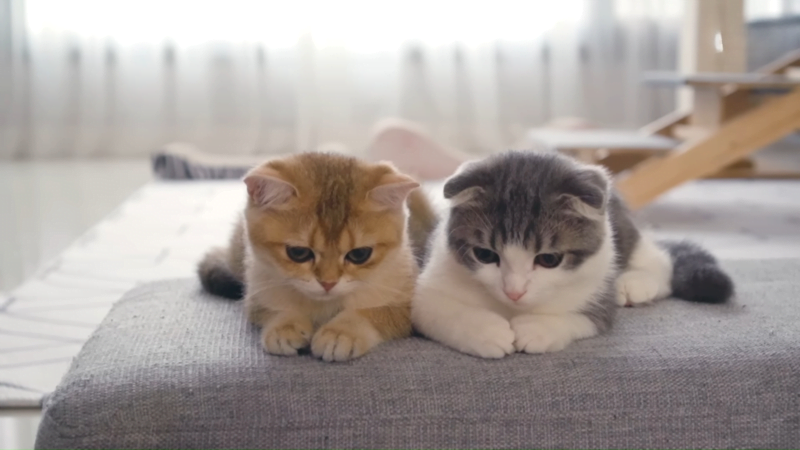No products in the cart.
Many people will ask, Can I mix CBD oil in cat food? when it comes to CBD for animals. This simple yet thought-provoking question has opened the doors to a fascinating journey of discovery. As pet owners, we are constantly seeking ways to enhance the well-being of our furry companions, and the idea of infusing CBD into their diet adds a layer of curiosity and promise. In this blog, we discover what CBD cat food, is cat food with CBD safe, its potential advantages, and the considerations that come with it.
What Is CBD Cat Food?
CBD cat food is a specialized type of pet food infused with cannabidiol (CBD), which is a non-psychoactive compound derived from the cannabis plant. This type of cat food is formulated to provide the potential benefits of CBD to felines. CBD interacts with the endocannabinoid system in cats, which plays a role in regulating various physiological processes, including mood, appetite, pain, and immune response. CBD cat food typically contains CBD oil or other CBD extracts derived from hemp plants. It’s important to note that CBD cat food should be formulated with cat-friendly ingredients and concentrations of CBD. Visit Pet CBD Club for a wider selection of wonderful CBD pet products.

The Benefits of CBD Cat Food
CBD cat food is believed to offer several potential benefits for feline companions. Some of these benefits include:
- Stress and Anxiety Reduction: CBD may help alleviate stress and anxiety in cats, particularly those prone to anxiety-inducing situations like travel or loud noises.
- Pain Management: CBD’s anti-inflammatory properties could aid in managing pain, especially in older cats or those with chronic conditions like arthritis.
- Support for Joint Health: CBD’s potential to reduce inflammation might contribute to improved joint health and mobility, benefiting cats with joint issues.
- Appetite Stimulation: CBD may help stimulate appetite in cats that have lost interest in eating due to illness or stress.
- Calm Behavior: CBD might promote a sense of calm and relaxation in cats, helping to soothe nervous or agitated behavior.
- Overall Wellness: CBD’s interaction with the endocannabinoid system could promote general well-being and homeostasis in cats.
Types of CBD Products for Cats
There are various types of CBD products designed specifically for cats, including:
- CBD Oil: Pure CBD for cat can be administered directly to cats’ mouths or added to their food. It allows for precise dosage control and flexibility.
- CBD Treats: CBD-infused treats come in various flavors and forms, making them a convenient way to administer CBD to cats.
- CBD Capsules: Capsules contain a pre-measured dose of CBD and can be hidden in food or treats.
- CBD Topicals: Topical CBD products, such as balms or creams, can be applied directly to a cat’s skin to potentially alleviate localized discomfort.
- CBD Cat Food: CBD-infused cat food combines the benefits of CBD with the nutritional elements of cat food, making it a holistic approach to wellness.
Concerns Around CBD Products for Felines
While CBD products for pets offer potential benefits, there are some concerns to be aware of:
- Lack of Regulation: The CBD industry for pets is not as strictly regulated as human CBD products, leading to variations in quality and efficacy.
- Dosage: Determining the appropriate CBD dosage for cats can be challenging and should be guided by a veterinarian to prevent overconsumption.
- Interaction with Medications: CBD might interact with certain medications, so it’s important to consult a veterinarian if a cat is on any medications.
- Quality Control: Not all CBD products are created equal. Choosing reputable brands with transparent sourcing and testing practices is crucial to ensure safety and effectiveness.
- Individual Sensitivity: Cats may react differently to CBD. Some cats may experience mild side effects like drowsiness or gastrointestinal upset.
- Underlying Health Conditions: CBD is not a replacement for medical treatment. Consulting a veterinarian is essential, especially if a cat has pre-existing health issues.
- THC Content: Ensure that CBD products used for cats contain negligible levels of THC, as THC can be toxic to them.
- Long-Term Effects: Research on the long-term effects of CBD use in cats is limited, so caution is advised when using CBD as a long-term supplement.
Is Cat Food with CBD Safe?
The safety of cat food with CBD depends on several factors, including the quality of the product, the proper dosage, and the individual cat’s health. Generally, when sourced from reputable brands and administered under veterinary guidance, CBD-infused cat food can be safe. However, it’s essential to exercise caution and consult a veterinarian before introducing any new dietary supplement to a cat’s routine.

Cat’s Reaction to CBD Food
Cats can react differently to CBD-infused food. Some may experience positive effects such as reduced anxiety or improved mobility, while others may not show noticeable changes. It’s important for cat owners to monitor their cat’s response to CBD food closely. Signs of a positive reaction could include increased calmness, improved appetite, or less pronounced signs of stress. Conversely, if a cat shows adverse effects like lethargy, gastrointestinal upset, or unusual behavior, it’s crucial to discontinue use and seek veterinary advice.
Guidelines for Using CBD
When considering CBD cat food, follow these guidelines to ensure the well-being of your feline friend:
- Consult a Veterinarian: Before introducing CBD cat food, consult a veterinarian who can assess your cat’s health, provide dosage recommendations, and determine if CBD is appropriate for your cat’s specific needs.
- Choose Reputable Brands: Opt for well-established brands that provide clear information about CBD content, sourcing, and manufacturing processes. Look for products tested by third-party laboratories to ensure quality and safety.
- Start with Low Dosage: Begin with a low dosage of CBD cat food and gradually increase it as advised by your veterinarian. This approach allows you to observe your cat’s reaction and adjust the dosage accordingly.
- Observe for Reactions: Pay close attention to how your cat responds to CBD food. Monitor for any changes in behavior, appetite, or overall well-being. If you notice any negative reactions, stop using the product and consult your veterinarian.
- Monitor Effectiveness: Over time, assess whether the CBD-infused cat food is producing the desired effects. Keep track of any improvements in behavior, mobility, or stress levels to determine their efficacy.
- Maintain Regular Vet Visits: Regular veterinary check-ups are essential, especially when introducing new supplements. Your vet can help track your cat’s progress and make adjustments as needed.
- Balance with a Balanced Diet: CBD cat food should complement a balanced and nutritionally complete diet. It should not replace essential nutrients from regular cat food.
Can I Mix CBD Oil in Cat Food?
Yes, you can mix CBD oil in cat food, but it’s important to do so with caution and under the guidance of a veterinarian. While CBD oil has the potential to offer benefits to cats, improper usage can lead to adverse effects. Consulting a vet ensures that you choose the right product, dosage, and method for your cat’s specific needs.

Considerations Before Mixing CBD Oil in Cat Food
Before mixing CBD oil in cat food, consider the following factors:
- Veterinary Consultation: Always consult a veterinarian before introducing CBD oil to your cat’s diet. They can provide tailored advice based on your cat’s health, age, and any existing medical conditions.
- Dosage Precision: Accurate dosing is crucial. CBD oil concentration varies, so a vet can recommend the appropriate dosage based on your cat’s weight and health status.
- Quality and Purity: Choose high-quality CBD oil that is specifically formulated for pets. Look for products that undergo third-party testing for purity, potency, and absence of contaminants.
- Taste and Palatability: Cats can be finicky eaters. Ensure the CBD oil has a taste that won’t deter your cats from eating their food.
- Oil Type and Carrier: CBD oil comes in various carrier oils (like hemp seed oil or MCT oil). Some oils may be more suitable for cats than others. Discuss options with your vet.
- Monitoring: Keep a close watch on your cat’s behavior, appetite, and overall well-being after introducing CBD oil. Note any changes and report them to your vet.
How to Choose the Right CBD Oil to Mix
Selecting the right CBD oil for your cat involves careful consideration:
- Consult Your Vet: Your veterinarian’s input is invaluable. They can recommend reliable brands and guide you toward products suitable for your cat’s health needs.
- Choose Hemp-Derived CBD: Opt for CBD oil derived from industrial hemp, as it contains minimal THC (the psychoactive compound) which can be harmful to cats.
- Look for Third-Party Testing: Reputable brands provide lab-tested products. Third-party testing ensures accurate labeling, CBD content, and the absence of harmful substances.
- Check Ingredients: CBD oil should have minimal additional ingredients. Avoid products with artificial flavors or additives that might upset your cat’s stomach.
- Concentration and Dosage: Select a CBD oil with a concentration appropriate for your cat’s size and health condition. Consult your vet for dosage recommendations.
- Sourcing and Transparency: Choose brands that provide information about the source of their hemp and extraction methods. Transparency indicates a commitment to quality.
Conclusion
Can I mix CBD oil in cat food? That leads to an interesting trip that might make life better for our animals. By delicately intertwining the advantages of CBD with our cats’ dietary choices, we open avenues to address stress, anxiety, pain, and more. However, this journey has a map for safe travel, just like any journey. The best way to make sure our furry friends benefit from CBD-infused cat chow is to consult with veterinarians, check the good things in CBD oil, and monitor how they react.
I am Nelson Cooper, I pursue my passion for writing and my belief is that cats love humans. I enjoy traveling and have a deep appreciation for the beauty of nature, as well as a soft spot for animals, particularly cats.



